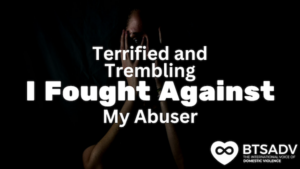She finally had the courage and safety plan in place to leave. It took all she could to muster up both the bravery and funds to take the children and go. She didn’t have much. For so long, she was a stay-at-home mom barely making ends meet because he kept a tight rein on the finances. He didn’t want her to work and always made her feel guilty about leaving the kids with childcare. She put in an application at the local grocery store making just above minimum wage. She knew it wasn’t enough but was hopeful that his child support would help tie the loose ends.
Over the next few months, she was horrified to see that his payment wasn’t coming in the mail. The divorce papers ordered it, yet he was in no hurry to comply. He knew he was one of the thousands of delinquent parents who were behind, that the process would be very long and painstaking for her to try to enforce, and the last thing he wanted to do was hand her money. “She left me, and now she will pay, literally and physically.” Those words frequently crossed his mind as he deviously smirked, consumed with anger and a vengeful heart. In his mind, this was her punishment. Although it was child support, it wasn’t about the kids. This was his way to continue the abuse and control her even after they were no longer together.
Financial abuse is a very common tactic in domestic violence situations. Studies show it happens in 99% of all cases (NNEDV, 2019). When the couple has children together, it can add more difficulty when trying to exit the relationship. If married, the divorce agreement would specify custody and child support terms, although, many settlements are not always followed. If the couple is unmarried, custody and child support would have to be filed to have a legal agreement in place. This can be a source of fear for survivors, as children are often used as pawns by the abuser. As overwhelming as this process can be, it’s easy to see why many victims stay with their abusers much longer than desired simply to avoid the legal battles.
There are many setbacks for survivors who are struggling to get child support payments. Some states have harsher penalties for delinquent parents such as jail time, driver’s license suspension, liens on properties and tax returns, etc., but many others aren’t as strict. Even if the case is filed through the enforcement agency, the Department of Revenue, it is a tedious and lengthy process, all while bills are still piling up for the survivor. If the ex-partner is paid “under the table” or doesn’t file taxes, it can be even more difficult to receive funds, and the process can drag on for years.
Another issue for many survivors is that they cannot afford legal representation to fight in court, to begin with. Many counties have free legal aid and lawyers who will represent survivors at no cost, but with such high demand due to a vast number of victims of domestic violence having little-to-no funds when exiting the relationship, the wait can be prolonged for services. It can feel helpless and discouraging for the survivor, just as the abuser wants.
In the US, each state currently maintains a Domestic Violence Coalition; however, only 20 states have a domestic violence commission, task force, or workgroup, and only one state, South Carolina, includes child support as part of its program. After surveying cases with formal orders of child support, one study showed that 37 percent of custodial parents attested to being abused by the child’s other parent before the child was the age of 3. There are obvious ties to domestic violence and a lack of financial responsibility from the abuser for the children involved, yet we are not seeing our government correlate the two with the statistics listed above. (NCSL, 2021)
Survivors of domestic violence are often left with a tremendous financial burden all while trying to heal from their emotional, mental, and sometimes physical scars. Many will seek government assistance and help from local shelters, but funds can be scarce, especially through COVID. The psychological mind games that the survivor endures just to give their children what they need while the other parent administers the affliction can feel like torture at times. It is important to recognize and acknowledge what the survivor is feeling, what they are going through, and call it what it is: abuse.
As frustrating as the process is, the survivor needs to be informed and empowered as to what they can do in the situation. Holding the abuser accountable is key. For far too long, many victims of abuse are guilted into taking responsibility for their partners, allowing them to get away with their malicious behavior. If money isn’t coming in like expected, it doesn’t mean it will always be that way. The survivor must hold their foot on the gas pedal and not give up the fight. The last thing an abuser expects is for the survivor to follow through and hold them responsible for their actions. They no longer have power if it’s not given to them.
The more child support delinquency and other forms of financial abuse are shed light upon regarding domestic violence, the greater the fight can become against it. For every survivor that is empowered, lives are statistically saved. Financial abuse is a complex but prevalent issue that is just as damaging as any other form of abuse, and it’s time to treat it as such.
References
National Conference of State Legislatures. (2021). Child support and domestic violence. NCSL. https://www.ncsl.org/research/human-services/child-support-and-domestic-violence.aspx
NNEDV: National Network to End Domestic Violence. (2019). Financial Abuse Fact Sheet. NNEDV: National Network to End Domestic Violence. https://nnedv.org/resources-library/financial-abuse-fact-sheet/









